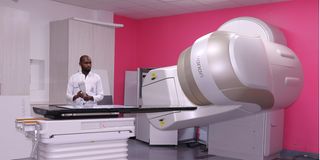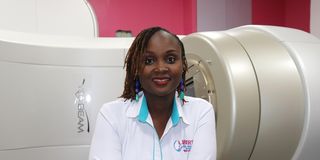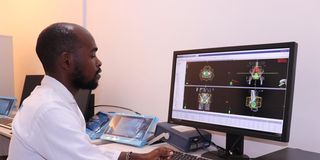New radiotherapy machine brings hope, cuts wait time for Nakuru patients

James Ngure, a Senior Medical Physicist at the Regional cancer centre in Nakuru operates the new radiotherapy machine on May 16,2025.
Cancer patients in Nakuru and the surrounding counties can now access faster and more precise treatment, thanks to the installation of a second machine at the Regional cancer centre within Nakuru Teaching and Referral Hospital (PGH).
The state-of-the-art radiotherapy machine is designed to deliver high-precision radiation treatment, targeting cancer cells, while minimizing damage to surrounding healthy tissue.
According to Dr. Siwillis Mithe, a Consultant Clinical & Radiation Oncologist and Head of the Oncology Department at Nakuru Regional Cancer Centre, the machine will significantly enhance the quality and speed of care.

Dr. Siwillis Mithe, a Consultant Clinical & Radiation Oncologist and Head of the Oncology Department at Nakuru Regional Cancer Centre during an interview on May 16,2025.
“Over the past three years, we’ve seen the patient numbers growing because surrounding counties are now aware that there is a radiotherapy facility offering services here. So patients keep coming in huge numbers- even from Eldoret, when the MTRH facility has long waiting times,” says Dr. Siwillis.
She explains that the initial single machine could no longer sustain the growing demand.
“For example, if we have 50 patients on one machine, they'll have to wait for the first batch of patients to finish treatment, then get treatment. Sometimes, the waiting period can be up to two or three months. This new machine will cut that down to about two weeks. And when treatment is delayed for three months, the disease progresses. The shorter the time to start treatment, the better the outcome.”
In addition to reducing waiting time, the second machine offers continuity in case of a breakdown of the first. “There will be no interruption of treatment- the second machine will accommodate the patients. This improves treatment reliability and patient outcomes,” she adds.
Nakuru received its first linear accelerator machine in mid-2022, and since then, the impact has been substantial.
“So far, we have treated close to 2,000 patients. We treat 50–60 patients per day. Many of them previously had to travel to Nairobi for radiotherapy,” Dr. Siwillis notes. “We serve patients from Nakuru, Laikipia, Bomet, Nyandarua, Kericho — even as far as Mombasa.”
On treatment affordability, she says, “With SHA coverage, radiotherapy is affordable. One session goes for Sh. 3,600, and depending on the type of cancer, patients may require between 15-35 sessions. The cost depends on the treatment site and the number of fractions. The challenge arises for patients not under any cover, as they must pay out of pocket.”
The Linear Accelerator is a computerized machine that delivers high-dose radiation precisely to the affected area to kill cancer cells. Unlike chemotherapy, which affects the entire body, this machine delivers localized treatment.
James Ngure, a Senior Medical Physicist at the facility, elaborates on how the technology works.

James Ngure, a Senior Medical Physicist analyzes a patient's CT scan at the Nakuru Regional Cancer Centre at PGH on May 16,2025.
“We first simulate and plan the treatment, then direct the radiation beams precisely to the location of the cancer. The goal is to accurately target the tumour while protecting surrounding healthy tissue. This machine is a game-changer, as it focuses purely on precision and accuracy,” he says.
As awareness continues to grow across the region, the centre is set to become a key pillar in the country’s fight against cancer.


